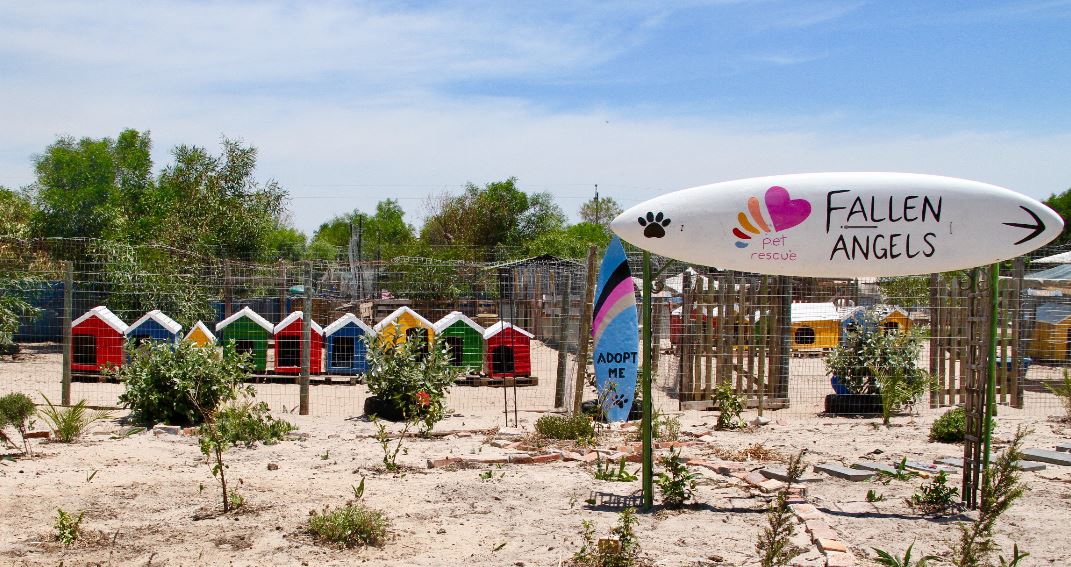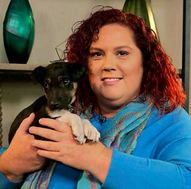|
THE PEOPLE AND THE STORY BEHIND FALLEN ANGELS by Linda Piegl - Senior Editor and Writer Wordart Services - [email protected] |
Making a dream reality
Gayl and Shireen were adamant that their shelter would be a pet rescue, not an animal rescue, so people would understand that they were responsible for the dogs or cats they adopted; that they were to be loved, protected and cared for. The shelter would also be family-friendly, aimed at changing the perception that such places were depressing. Fallen Angels was going to be an uplifting place to visit with happy, well-looked-after dogs.
This was February 2014 and Shireen and Gayl still lived in their respective houses and Fallen Angels was still a dream. Within that year, however, Gayl was able to sell her house and started looking for a farm where she and Shireen could establish their shelter. “With a small budget, all I was able to afford was 22 hectares of bush in Duynefontein,” laughs Gayl. “There was truly nothing there – just bush and sand.”
Early days
Undeterred, Gayl bought the land and with the help of her father, a portion was flattened and cleared. With donated Wendy houses, pallets and containers, a backyard with camps and kennels took shape where the rescues settled in. By the end of 2014, Gayl had also moved in.
“One of the Wendy houses was the office and it doubled-up as a bedroom for my daughter and me,” she explains. “We slept on blow-up mattresses and had to ‘camp’ as there was no electricity or water. We used gas cookers, installed solar panels and generators and became pros at living rough! But it taught us a valuable lesson – that we can do anything we put our minds to. It also made us appreciate the small things, the comforts we usually take for granted in life.”
Gayl and Shireen never lost sight of the bigger picture, their calling, even though it took a long time for houses to be built and a year for electricity to come to Fallen Angels. Today, they continue to live on the property with 17 staff members, who are available for the animals 24/7. “Because we live with the dogs, we really get to know them and are able to assess them properly prior to adoption,” Gayl says. “We often don’t know their histories and can’t always depend on what we are told.”
Gayl and Shireen were adamant that their shelter would be a pet rescue, not an animal rescue, so people would understand that they were responsible for the dogs or cats they adopted; that they were to be loved, protected and cared for. The shelter would also be family-friendly, aimed at changing the perception that such places were depressing. Fallen Angels was going to be an uplifting place to visit with happy, well-looked-after dogs.
This was February 2014 and Shireen and Gayl still lived in their respective houses and Fallen Angels was still a dream. Within that year, however, Gayl was able to sell her house and started looking for a farm where she and Shireen could establish their shelter. “With a small budget, all I was able to afford was 22 hectares of bush in Duynefontein,” laughs Gayl. “There was truly nothing there – just bush and sand.”
Early days
Undeterred, Gayl bought the land and with the help of her father, a portion was flattened and cleared. With donated Wendy houses, pallets and containers, a backyard with camps and kennels took shape where the rescues settled in. By the end of 2014, Gayl had also moved in.
“One of the Wendy houses was the office and it doubled-up as a bedroom for my daughter and me,” she explains. “We slept on blow-up mattresses and had to ‘camp’ as there was no electricity or water. We used gas cookers, installed solar panels and generators and became pros at living rough! But it taught us a valuable lesson – that we can do anything we put our minds to. It also made us appreciate the small things, the comforts we usually take for granted in life.”
Gayl and Shireen never lost sight of the bigger picture, their calling, even though it took a long time for houses to be built and a year for electricity to come to Fallen Angels. Today, they continue to live on the property with 17 staff members, who are available for the animals 24/7. “Because we live with the dogs, we really get to know them and are able to assess them properly prior to adoption,” Gayl says. “We often don’t know their histories and can’t always depend on what we are told.”
Leading the pack
Gayl and her team are trained in the aspects of dog behaviour required for shelters, having most recently studied with canine behaviouralist Scotty Valadao of Friends of the Dog. They are pioneering a new approach in the rescue industry by offering basic behaviour advice and training to owners before they take their new family member home, as well as facilitating the introduction of existing dogs to the new addition, ensuring they get on well. To this end, Friends of the Dog and several sponsors raised funds to build a separate introduction area where these ‘meet and greets’ can take place on neutral territory (not in the existing dogs’ homes) and without distractions from the main shelter.
Fallen Angels also stays in touch with owners via email for up to three months after adoption to assist with queries, information and problems. “This helps hugely to prevent dogs being returned,” says Gayl, and as a result, Fallen Angels’ adoption success rate is high.
From between 30 to 60 animals in their care when they first launched, there are now 350 residents when Fallen Angels is at full capacity. Dogs are the main ‘angels’ at the shelter but there are a few cats available for adoption. The land is also a cat sanctuary for about 10 to 12 felines suffering from Feline AIDS (FIV), who can live out their lives there. “They have access to my bedroom and love sleeping on my bed. They are part of the family.”
Gayl and her team are trained in the aspects of dog behaviour required for shelters, having most recently studied with canine behaviouralist Scotty Valadao of Friends of the Dog. They are pioneering a new approach in the rescue industry by offering basic behaviour advice and training to owners before they take their new family member home, as well as facilitating the introduction of existing dogs to the new addition, ensuring they get on well. To this end, Friends of the Dog and several sponsors raised funds to build a separate introduction area where these ‘meet and greets’ can take place on neutral territory (not in the existing dogs’ homes) and without distractions from the main shelter.
Fallen Angels also stays in touch with owners via email for up to three months after adoption to assist with queries, information and problems. “This helps hugely to prevent dogs being returned,” says Gayl, and as a result, Fallen Angels’ adoption success rate is high.
From between 30 to 60 animals in their care when they first launched, there are now 350 residents when Fallen Angels is at full capacity. Dogs are the main ‘angels’ at the shelter but there are a few cats available for adoption. The land is also a cat sanctuary for about 10 to 12 felines suffering from Feline AIDS (FIV), who can live out their lives there. “They have access to my bedroom and love sleeping on my bed. They are part of the family.”
Angel initiatives
With around a million dogs and cats being euthanised in South Africa every year, Fallen Angels’ main focus is on sterilisation to prevent more unwanted animals being born. They have a target of sterilising 50 animals a month, which also ends the cycle of seasonal births.
Their secondary aim is to educate schoolchildren whether in the city, the townships or in rural areas. “We believe strongly that the biggest change can be brought about by teaching kids that animals are sentient beings who look to us humans for their welfare,” Gayl stresses. Fallen Angels also invites children to the shelter and they arrive in busloads to interact with the dogs and learn about their care.
Fallen Angels works with several organisations that focus on animal welfare in the townships, such as the SA Mass Animal Sterilisation Trust, a clinic in Khayelitsha where animals are also often surrendered, and the Mitchells Plain Animal Welfare that Fallen Angels helped a resident to set up. “Many organisations don’t have their own shelters so they bring animals to us,”Gayl explains.
Then there are the Fallen Angels adoption days at shopping centres and other select venues, which have been going since 2014 and are well-known. “We set up enclosures, lay down fake grass, and have some of our adorable puppies available to view and interact with under the watchful eye of our volunteers.” Shoppers can offer to donate or adopt but Fallen Angels doesn’t allow any puppies to be homed on the day, as they have a strict adoption procedure to follow. It includes a home check and assessment of the family’s lifestyle, work hours and so on.
With around a million dogs and cats being euthanised in South Africa every year, Fallen Angels’ main focus is on sterilisation to prevent more unwanted animals being born. They have a target of sterilising 50 animals a month, which also ends the cycle of seasonal births.
Their secondary aim is to educate schoolchildren whether in the city, the townships or in rural areas. “We believe strongly that the biggest change can be brought about by teaching kids that animals are sentient beings who look to us humans for their welfare,” Gayl stresses. Fallen Angels also invites children to the shelter and they arrive in busloads to interact with the dogs and learn about their care.
Fallen Angels works with several organisations that focus on animal welfare in the townships, such as the SA Mass Animal Sterilisation Trust, a clinic in Khayelitsha where animals are also often surrendered, and the Mitchells Plain Animal Welfare that Fallen Angels helped a resident to set up. “Many organisations don’t have their own shelters so they bring animals to us,”Gayl explains.
Then there are the Fallen Angels adoption days at shopping centres and other select venues, which have been going since 2014 and are well-known. “We set up enclosures, lay down fake grass, and have some of our adorable puppies available to view and interact with under the watchful eye of our volunteers.” Shoppers can offer to donate or adopt but Fallen Angels doesn’t allow any puppies to be homed on the day, as they have a strict adoption procedure to follow. It includes a home check and assessment of the family’s lifestyle, work hours and so on.
Healing hounds
The Fallen Angels residents are proving to be excellent therapy dogs (without formal therapy training and simply using their natural charm and unconditional love). “We network with social workers who bring mentally ill patients or depressed, suicidal teens to us and the change in them after interacting with our dogs is remarkable. They leave saying how happy and calm they feel,” Gayl says. “Even the National Institute for Crime Prevention and the Reintegration of Offenders (Nicro) sends people to us to do their community hours and we are delighted that so many of them return after completion to spend time with our dogs.”
The Fallen Angels residents are proving to be excellent therapy dogs (without formal therapy training and simply using their natural charm and unconditional love). “We network with social workers who bring mentally ill patients or depressed, suicidal teens to us and the change in them after interacting with our dogs is remarkable. They leave saying how happy and calm they feel,” Gayl says. “Even the National Institute for Crime Prevention and the Reintegration of Offenders (Nicro) sends people to us to do their community hours and we are delighted that so many of them return after completion to spend time with our dogs.”

Rewarding but challenging
Gayl, Shireen and their team are passionate about their work and making a difference in animals’ lives but as with any rescue organisation dependent on the generosity of the public and of businesses, their expenses are their greatest challenge, especially the vet bills. “It costs between R75 000 and R100 000 a month to keep Fallen Angels going,” admits Gayl. “Because the dogs that come to us are not surrenders from good homes, most of them are severely undernourished, ill, need surgery or behavioural therapy. This is ongoing care that is incredibly costly. We are always hard at work with fundraising efforts and events, but what we wish for the future of our industry is more recognition for shelters and more support from government, the public and corporates.”
Gayl, Shireen and their team are passionate about their work and making a difference in animals’ lives but as with any rescue organisation dependent on the generosity of the public and of businesses, their expenses are their greatest challenge, especially the vet bills. “It costs between R75 000 and R100 000 a month to keep Fallen Angels going,” admits Gayl. “Because the dogs that come to us are not surrenders from good homes, most of them are severely undernourished, ill, need surgery or behavioural therapy. This is ongoing care that is incredibly costly. We are always hard at work with fundraising efforts and events, but what we wish for the future of our industry is more recognition for shelters and more support from government, the public and corporates.”
|
Contact:
Gayl Basson: 084 688 7111 (WhatsApp mornings only please) [email protected] www.fallenangels.org.za Fallen Angels Pet Rescue is a registered NPO (NPO 175-638) focusing on the rescue, rehabilitation and rehoming of domestic animals. |
Fallen Angels would like to thank the following businesses, in no particular order, for their invaluable contribution to saving lives and supporting our work. In return, we ask the public to please support them:
Network for Animals, Bidvest Van Rental, Pinpoint Tracking, My Cover Plus, Sonic, Century 21, Dancers Love Dogs, Vondis, Absolute Pets, Instant Tags, Animal Rescue Rehab Organisation (ARRO), Doggobone, RE/MAX and Freshstop. |



